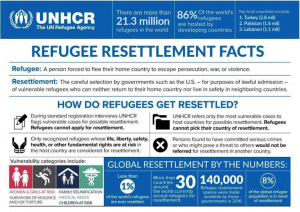“The irony in this is that this is a country that people are fleeing to…[but it’s] becoming one of tyranny, is becoming one of dictatorship and is becoming one that’s turning its face against the values that it’s supposed to stand for.” – Ilhan Omar
An executive order signed on January 27th, ominously falling on Holocaust Remembrance Day, enacts a series of changes impacting people from Iraq, Iran, Syria, Somalia, Libya, Sudan, and Yemen. The Twin Cities, home to the largest Somali community in the US, is heavily struck. In just the last three months of 2016, 433 Somali refugees were resettled in Minnesota contributing to a total of approximately 77,000 Somalis in the Twin Cities. Almost two-decades of civil war has resulted in one of the largest displacement crises, with almost 1 million registered as refugees, and another 1.1 million displaced within Somalia.
In response to the immigration ban, the Somali community in the Twin Cities has been quick to organize a meeting to provide context as well as determine a community-driven resistance plan. The meeting was moderated by elected State Representative, Ilhan Omar, who is a Somali-American refugee and daughter of a Yemeni-Somali woman. The Council on American-Islamic Relation (CAIR)’s director, Jaylani Hussein, provided historical context on the US’s history of immigration bans, as well as assured the community that CAIR is equipped and ready to handle increasing islamophobia, beginning with filing a lawsuit against the executive order. Speakers urged the community to be educated, to donate, to volunteer, to show up, and to continue fighting back against surveillance. In addition to community meetings, almost 1000 people protested the immigration ban at MSP International Airport.

Trump’s nationalist rhetoric of security posits individuals coming from Iraq, Iran, Syria, Somalia, Libya, Sudan, and Yemen as possible terrorists. However, this immigration ban completely ignores the extreme vetting system that is already in place. The resettlement process takes 18-24 months on average, requiring multiple extensive steps. Applicants must first be referred to the UN High Commissioner for Refugees (UNHCR), and less than 1% go on to be subjected to the highest level of security checks. This involves multiple interviews, impeccable documents, biographic checks, biometric checks, and medical checks. Applicants must then go through cultural orientation classes as they wait for placement. Only if they pass additional screening do they get matched with a resettlement agency and finally move to the US. Throughout the entire process, refugees are screened by the UNHCR, the U.S. State Department, the FBI, and the U.S. Department of Homeland Security.

Trump’s portrayal of Somali Muslims as inevitable terrorists, overlooks the role of the US in contributing to the global current state of affairs. To point fingers at other countries in general, and Somalia in particular, ignores the US’s responsibility in contributing to instability, particularly as it continues to wage a war on terror on Somali soil. Rather, the immigration ban is a distraction and is grounded in Anti-Muslim, Anti-African, and Anti-Middle Eastern sentiments that have long existed and have been stoked by previous administrations. Banning refugees and immigrants from entering the US is not the answer, and in the meantime the Somali(-American) community in Minneapolis continues to resist and organize against xenophobia and islamophobia.
Miray Philips is a Ph.D. graduate student in Sociology with a focus on conflict, identity, and collective memory in the Middle East and North Africa. Miray’s current research is focused on how Copts in the diaspora make sense of and respond to current events in Egypt. She is also the 2016-17 Badzin Fellow.

Comments